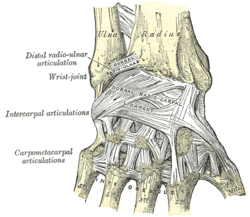Sellar joint
| Saddle joint | |
|---|---|

1: Ball and socket joint; 2: Condyloid joint (Ellipsoid); 3: Saddle joint; 4 Hinge joint; 5: Pivot joint;
|
|

Ligaments of wrist. Posterior view.
|
|
| Details | |
| Identifiers | |
| Latin | articulatio sellaris |
| Dorlands /Elsevier |
a_64zPzhtm#/12161531 |
| TA | A03.0.00.048 |
|
Anatomical terminology
[]
|
|
In a saddle joint (sellar joint, articulation by reciprocal reception) the opposing surfaces are reciprocally concave-convex.
The movements are as same as in the condyloid joint; that is to say, flexion, extension, adduction, abduction, and circumduction are allowed; but no axial rotation. Saddle joints are said to be biaxial, allowing movement in the sagittal and frontal planes.
The best examples of saddle joints are the carpals and metacarpals of thumb and the trapezium of the wrist.
This article incorporates text in the public domain from the 20th edition of Gray's Anatomy (1918)
...
Wikipedia
